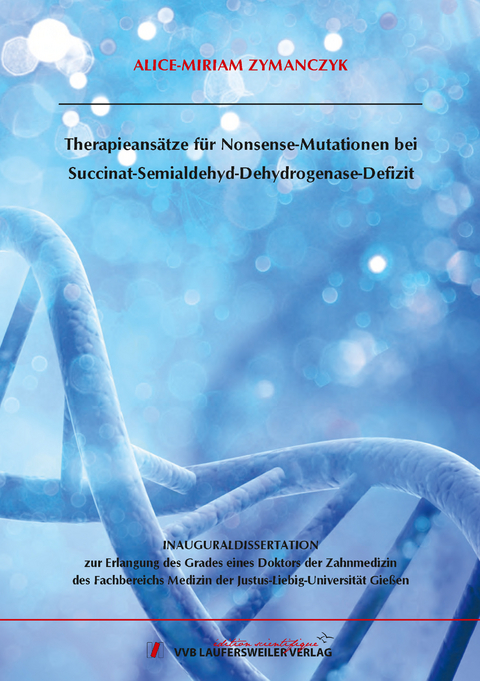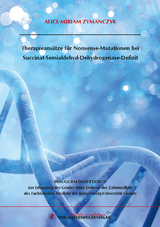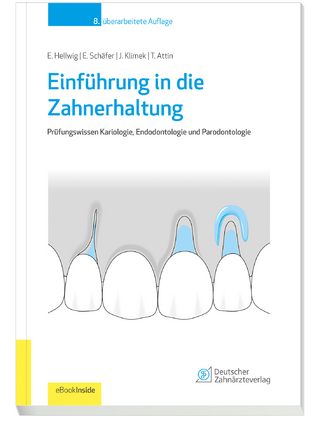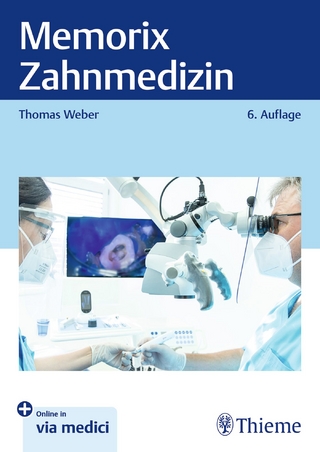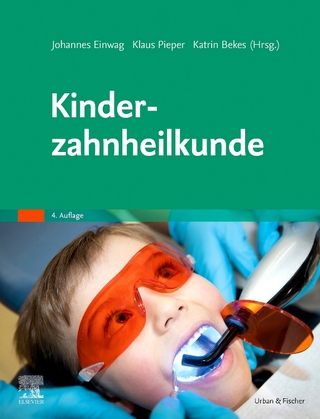Therapieansätze für Nonsense-Mutationen bei Succinat-Semialdehyd-Dehydrogenase-Defizit
Seiten
2021
VVB Laufersweiler Verlag
978-3-8359-6987-2 (ISBN)
VVB Laufersweiler Verlag
978-3-8359-6987-2 (ISBN)
- Keine Verlagsinformationen verfügbar
- Artikel merken
Das SSADH-Defizit ist eine seltene, autosomal-rezessiv vererbte Stoffwechselstörung, bei welcher es durch den Mangel des NAD+-abhängigen Enzyms Succinat-Semialdehyd-Dehydrogenase (SSADH) zur mangelnden Umwandlung von Succinat-Semialdehyd zu Succinat und zu einem Anstieg des GABA- und vor allem des GHB-Spiegels kommt. Folgen können sich in Form von Verzögerungen der motorischen, mentalen und sprachlichen Entwicklung darstellen, wobei der Schweregrad von leicht bis schwer reichen kann. Bislang sind noch keine effektiven Therapiemöglichkeiten bekannt. Es ist lediglich eine Linderung der Symptome möglich, wie zum Beispiel die Verbesserung der Motorik durch Physiotherapie und die der Sprache durch Logopädie.
Das Hauptziel dieser Arbeit bestand aufgrund der fehlenden Therapiemöglichkeiten darin, Therapieansätze für Nonsense-Varianten bei SSADH-Defizit zu erforschen. Dafür wurden die Auswirkungen der Behandlungen verschiedener Nonsense-Varianten (Gln79X, Tyr128X, Gln133X, Lys192X, Trp204X, Ser251X, Arg261X, Arg412X, Gln477X, Arg514X und Tyr519X) mittels „translational read-through inducing drugs“, wie Amlexanox, Gentamicin und PTC124, sowie mit dem mRNA-stabilisierenden Coffein anhand von Western-Blots sowie eines Fluoreszenz-basierten SSADH-Aktivitätsassays untersucht.
Die Untersuchungen ergaben, dass die Behandlungen aller Varianten mit den einzelnen Substanzen Amlexanox, Gentamicin oder PTC124 im Western-Blot keine systematisch verstärkte Proteinexpression aufwiesen. Im Aktivitätsassay wurde nur bei der Variante Trp204X durch die Behandlung mit Amlexanox eine signifikante Steigerung der SSADH-Aktivität ersichtlich. Die Doppelbehandlungen führten in der Aktivitätsmessung wiederum zu keiner signifikanten Steigerung der SSADH-Aktivität. Im Western-Blot zeigte die Behandlung mit Amlexanox und Coffein bei den Varianten Gln79X, Lys192X, Trp204X und Arg412X ein systematisch positives Ergebnis. Bei der Behandlung mit PTC124 und Coffein war das Ergebnis bei den Varianten Gln79X, Lys192X und Trp204X ebenfalls systematisch positiv.
Da die Ergebnisse des Western-Blots und der Aktivitätsmessung zum Teil variieren, ist nicht klar zu sagen, ob die Therapien am Patienten erfolgversprechend wären. Insgesamt lässt sich aus den Ergebnissen allerdings schließen, dass die Behandlung der Nonsense-Varianten bei SSADH-Defizit Varianten-spezifisch erfolgen sollte. SSADH deficiency is a rare, autosomal recessively inherited metabolic disorder, leading to an inadequate conversion of succinic semialdehyde to succinic acid and to an increase of GABA and especially of GHB levels due to a deficit of the NAD+-dependent enzyme succinic semialdehyde dehydrogenase (SSADH). As a consequence, a delay of the motor, mental and language development can be observed, but the symptoms can range from mild to severe. So far, there are no effective therapy options known. Only a mitigation of the symptoms is available, for example by means of improvement of the mobility through physiotherapy and improvement of the language through speech therapy.
Due to the lack of options for treatment, the main goal of this project was to explore new therapeutic approaches for nonsense variants within the SSADH coding region. For this purpose, a variety of effects of the treatment of different nonsense variants (Gln79X, Tyr128X, Gln133X, Lys192X, Trp204X, Ser251X, Arg261X, Arg412X, Gln477X, Arg514X and Tyr519X) was investigated with translational read-through inducing drugs, such as amlexanox, gentamicin and PTC124, as well as with the mRNA-stabilizing drug caffeine, based on Western blot and the SSADH activity assay.
The data revealed that the treatment of the variants with one of the substances amlexanox, gentamicin and PTC124, did not exhibit any systematically reinforced protein expression in the Western blot. In the activity assay, a significant increase of SSADH activity was only evident for the variant Trp204X upon treatment with amlexanox. Likewise, the combination of the above drugs with caffeine led to no significant increase in SSADH activity. In the Western blot, the treatment with amlexanox and caffeine on the variants Gln79X, Lys192X, Trp204X and Arg412X showed a systematically positive result. In the case of the treatment with PTC124 and caffeine on the variants Gln79X, Lys192X and Trp204X, the result was also systematically positive.
Due to the discrepancy between the Western blot and the activity measurement, it is not clear whether the tested substances would be promising for the treatment of patients. Thus, it can be concluded that the treatment of the nonsense variants at SSADH deficiency should take place in a variant-specific manner after prior testing.
Das Hauptziel dieser Arbeit bestand aufgrund der fehlenden Therapiemöglichkeiten darin, Therapieansätze für Nonsense-Varianten bei SSADH-Defizit zu erforschen. Dafür wurden die Auswirkungen der Behandlungen verschiedener Nonsense-Varianten (Gln79X, Tyr128X, Gln133X, Lys192X, Trp204X, Ser251X, Arg261X, Arg412X, Gln477X, Arg514X und Tyr519X) mittels „translational read-through inducing drugs“, wie Amlexanox, Gentamicin und PTC124, sowie mit dem mRNA-stabilisierenden Coffein anhand von Western-Blots sowie eines Fluoreszenz-basierten SSADH-Aktivitätsassays untersucht.
Die Untersuchungen ergaben, dass die Behandlungen aller Varianten mit den einzelnen Substanzen Amlexanox, Gentamicin oder PTC124 im Western-Blot keine systematisch verstärkte Proteinexpression aufwiesen. Im Aktivitätsassay wurde nur bei der Variante Trp204X durch die Behandlung mit Amlexanox eine signifikante Steigerung der SSADH-Aktivität ersichtlich. Die Doppelbehandlungen führten in der Aktivitätsmessung wiederum zu keiner signifikanten Steigerung der SSADH-Aktivität. Im Western-Blot zeigte die Behandlung mit Amlexanox und Coffein bei den Varianten Gln79X, Lys192X, Trp204X und Arg412X ein systematisch positives Ergebnis. Bei der Behandlung mit PTC124 und Coffein war das Ergebnis bei den Varianten Gln79X, Lys192X und Trp204X ebenfalls systematisch positiv.
Da die Ergebnisse des Western-Blots und der Aktivitätsmessung zum Teil variieren, ist nicht klar zu sagen, ob die Therapien am Patienten erfolgversprechend wären. Insgesamt lässt sich aus den Ergebnissen allerdings schließen, dass die Behandlung der Nonsense-Varianten bei SSADH-Defizit Varianten-spezifisch erfolgen sollte. SSADH deficiency is a rare, autosomal recessively inherited metabolic disorder, leading to an inadequate conversion of succinic semialdehyde to succinic acid and to an increase of GABA and especially of GHB levels due to a deficit of the NAD+-dependent enzyme succinic semialdehyde dehydrogenase (SSADH). As a consequence, a delay of the motor, mental and language development can be observed, but the symptoms can range from mild to severe. So far, there are no effective therapy options known. Only a mitigation of the symptoms is available, for example by means of improvement of the mobility through physiotherapy and improvement of the language through speech therapy.
Due to the lack of options for treatment, the main goal of this project was to explore new therapeutic approaches for nonsense variants within the SSADH coding region. For this purpose, a variety of effects of the treatment of different nonsense variants (Gln79X, Tyr128X, Gln133X, Lys192X, Trp204X, Ser251X, Arg261X, Arg412X, Gln477X, Arg514X and Tyr519X) was investigated with translational read-through inducing drugs, such as amlexanox, gentamicin and PTC124, as well as with the mRNA-stabilizing drug caffeine, based on Western blot and the SSADH activity assay.
The data revealed that the treatment of the variants with one of the substances amlexanox, gentamicin and PTC124, did not exhibit any systematically reinforced protein expression in the Western blot. In the activity assay, a significant increase of SSADH activity was only evident for the variant Trp204X upon treatment with amlexanox. Likewise, the combination of the above drugs with caffeine led to no significant increase in SSADH activity. In the Western blot, the treatment with amlexanox and caffeine on the variants Gln79X, Lys192X, Trp204X and Arg412X showed a systematically positive result. In the case of the treatment with PTC124 and caffeine on the variants Gln79X, Lys192X and Trp204X, the result was also systematically positive.
Due to the discrepancy between the Western blot and the activity measurement, it is not clear whether the tested substances would be promising for the treatment of patients. Thus, it can be concluded that the treatment of the nonsense variants at SSADH deficiency should take place in a variant-specific manner after prior testing.
| Erscheinungsdatum | 10.01.2022 |
|---|---|
| Reihe/Serie | Edition Scientifique |
| Verlagsort | Gießen |
| Sprache | deutsch |
| Maße | 148 x 210 mm |
| Gewicht | 150 g |
| Themenwelt | Medizin / Pharmazie ► Zahnmedizin ► Klinik und Praxis |
| Schlagworte | Amlexanox • Coffein • Gentamicin • PTC124 • SSADH • SSDD |
| ISBN-10 | 3-8359-6987-0 / 3835969870 |
| ISBN-13 | 978-3-8359-6987-2 / 9783835969872 |
| Zustand | Neuware |
| Haben Sie eine Frage zum Produkt? |
Mehr entdecken
aus dem Bereich
aus dem Bereich
Prüfungswissen Kariologie, Endodontologie und Parodontologie
Buch (2023)
Deutscher Ärzteverlag
69,99 €
